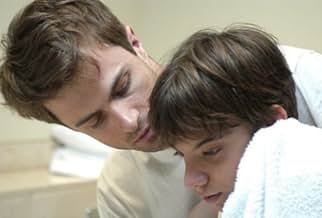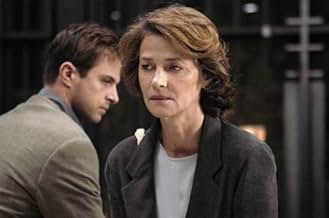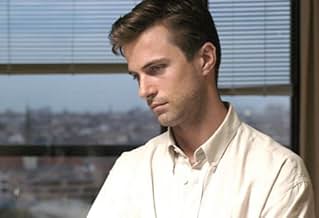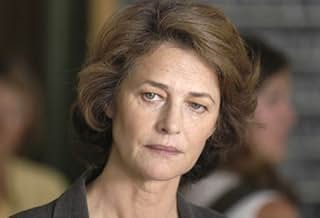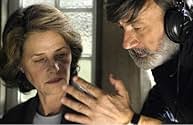VALUTAZIONE IMDb
7,1/10
2520
LA TUA VALUTAZIONE
Incontrando per la prima volta il figlio disabile, un giovane padre cerca di instaurare un rapporto con l'adolescente.Incontrando per la prima volta il figlio disabile, un giovane padre cerca di instaurare un rapporto con l'adolescente.Incontrando per la prima volta il figlio disabile, un giovane padre cerca di instaurare un rapporto con l'adolescente.
- Regia
- Sceneggiatura
- Star
- Premi
- 15 vittorie e 22 candidature totali
Recensioni in evidenza
I've got to say that this film had touched me so much in both simple and extraordinary ways. There are lots of drama movies out there whose theme seems to rust off compared to this one, and I proclaim to be heart-touched. Le Chiavi di Casa or also known as The keys to the house, had made the most authentic impact to our modern lives. The story runs with to main characters of Gianni (Kim Rossi Stuart) and Paolo (Andrea Rossi), whose relationship are embraced by new encounter of a father and son relationship. Gianni who haven't met his son since her wife died of giving birth to Paolo had found a chance to finally meet him. Paolo on the other hand who suffered a mildly intricate condition of being handicapped attempts to forge as well a connection with his father he never met before (and I never imagined that Andrea Rossi did really suffered a real life Muscular Dystrophywhich fitted him in the role, and thanks to the part of Gianni Amelio who earned and molded Andrea's confidence). The eloquence of the story showed the archetypal impact between a young father who haven't seen his son and tries to build unyielding relationship with a son by ways of bidding his entire life to the only family he gotPaolo.
Though the original copy of this movie sold for an expensive rate of price in our place, I would really love to spend my time watching movie with explicit sincerity and magnificence. Le Chiavi de Casa had proved not only my money but as well my time and heart worthwhile.
Though the original copy of this movie sold for an expensive rate of price in our place, I would really love to spend my time watching movie with explicit sincerity and magnificence. Le Chiavi de Casa had proved not only my money but as well my time and heart worthwhile.
We thought this was a touching story of the real tragedy of a parent dealing with the life-long disability, all the more so since this parent had walked away so early in child's life. We were much impressed with Charlotte Rampling, who we have seen in many good roles, who gave a marvelous portrayal of parent who have given her whole life to the care of her own daughter, willingly, but with the admonishment to the younger father in brutal honestly, to be prepared to suffer. We also wonder about her use of languages. Last film we saw she spoke French, and in this one Italian and German. Does she really speak these all, or her words dubbed in? We're glad she is working and always a true professional.
I just saw this film, and since I don't like to talk about scenes in the film because I don't wish to spoil it for those who haven't seen it, I wanted to at least give my recommendation, and high praise for this piece. This is a film you have to see for yourself, the performances delivered are some of the best I have ever seen. It is so deeply moving and touching. My face was literally a faucet through the whole film, and I don't recall ever seeing and film that made that happen to me. As an actress myself, I can only hope to someday deliver performance such as the ones in this movie. There is so much said in this film without words, I was so deeply impressed. Needless to say, I give this 10 stars, and I heartily recommend it to everyone. *Note: It helps to have a box of Kleenex and a strong heart to watch this, also if you watch this and don't get "any" of it (for I know some may have trouble) you need to watch it again, because everything that needs to be said is there and more*
Gianni (Kim Rossi Stuart) has never seen his son Paolo, who is disabled. But Fate makes them meet, Gianni accompanies him to Germany where the child can follow a new therapy... It is also a trip where the young father tries to catch up with the relationship with his son. In hospital Gianni meets a woman (Charlotte Rampling) who has a also a disabled daughter, a woman which teaches him very much about accepting differences.
Gianni Amelio doesn't direct a spectacular movie about handicap (it's not like "Rain Man"), he directs a road movie which seems sometimes (from a technical point of view) a documentary. There's not room for too many tears, dramas and moralistic considerations. It's a pretty film which has the goal of showing problems the way they are, without exaggerations. There's much reality and humanity.
Gianni Amelio doesn't direct a spectacular movie about handicap (it's not like "Rain Man"), he directs a road movie which seems sometimes (from a technical point of view) a documentary. There's not room for too many tears, dramas and moralistic considerations. It's a pretty film which has the goal of showing problems the way they are, without exaggerations. There's much reality and humanity.
Director Gianni Amelio coaxed a wonderful performance from Andrea Rossi in this film - his lines were fed to him by the director, allowing this young non-actor to appear spontaneous. His charm and his stubbornness were powerful and endearing, and it would seem that it was the boy's real character and personality that were being very gently and cleverly allowed to shine.
Apart from Andrea Rossi, the strength of the film lay with Charlotte Rampling - although her part was a supporting role, her intelligence and dignity made a strong impact, and you wished that she would be there to counsel and guide Gianni through future events that he would perhaps not handle too well. She has matured into a very fine actress indeed, and one hopes that she will get the kind of roles she deserves in the future.
My first thought was that Kim Rossi-Stuart wasn't a good choice for the lead - good-looking certainly, but way too wooden an actor to carry a role as demanding as that of Gianni. On reflection, however, I wondered if casting an actor who appeared to have very little to give his role emotionally was deliberate, because it wasn't hard to believe that this was a man who deserted his son at his birth. Even when he slowly began to warm to his son, and we knew he desperately wanted to help, he was still awkward as he tried to compensate for his instinctive emotional detachment.
When he took his son from the hospital - clearly before his round of treatment was completed (this would certainly have to be an ongoing routine for Paolo) - this was not the action of a responsible, loving father but an act of rebellion from an immature man who couldn't, or wouldn't, see that the painful procedures were the only hope for some small improvement in Paolo's condition, and something that the boy himself accepted and participated in, however much he hated it.
Taking Paolo to Norway to visit his "girlfriend" Kristine was not an act of kindness, but one of insensitivity - in earlier scenes, although Paolo spoke of one day marrying her, he also had all sorts of excuses for not being able to meet her. Clearly, he was able to understand what his father could not - that she may reject him when she realised that he was not like other boys; yet he trusted his father enough to take the chance. It was when Gianni threw away his walking stick that I felt he had made very little progress from the boy who couldn't face up to his responsibilities to his motherless son - he was acting less from a desire to help Paolo walk on his own than he was trying to pretend that the boy's disabilities could be cured by an act of will and that he would one day be more like a "normal" son. This was explored further during the driving scene - having told Nicole earlier that Paolo didn't know how to construct boundaries, he encouraged him to think that he could drive and was then shattered when he realised the extent to which his son could at times fail to recognise the limitations that would always confront him. Was Paolo himself unconsciously trying to teach his father a lesson by behaving in the same irresponsible way that Gianni had been?
The ending of the film therefore presented us with two possibilities - Gianni's newly-awakened love might lead him to a new sense of maturity and responsibility if he could accept that love was not going to be a miracle cure, or he just might once again abandon his child to others. For Paolo's sake and his father's too, I'd like to think that Gianni would have developed a new perspective on his physical and emotional journey with his difficult and beautiful son.
Apart from Andrea Rossi, the strength of the film lay with Charlotte Rampling - although her part was a supporting role, her intelligence and dignity made a strong impact, and you wished that she would be there to counsel and guide Gianni through future events that he would perhaps not handle too well. She has matured into a very fine actress indeed, and one hopes that she will get the kind of roles she deserves in the future.
My first thought was that Kim Rossi-Stuart wasn't a good choice for the lead - good-looking certainly, but way too wooden an actor to carry a role as demanding as that of Gianni. On reflection, however, I wondered if casting an actor who appeared to have very little to give his role emotionally was deliberate, because it wasn't hard to believe that this was a man who deserted his son at his birth. Even when he slowly began to warm to his son, and we knew he desperately wanted to help, he was still awkward as he tried to compensate for his instinctive emotional detachment.
When he took his son from the hospital - clearly before his round of treatment was completed (this would certainly have to be an ongoing routine for Paolo) - this was not the action of a responsible, loving father but an act of rebellion from an immature man who couldn't, or wouldn't, see that the painful procedures were the only hope for some small improvement in Paolo's condition, and something that the boy himself accepted and participated in, however much he hated it.
Taking Paolo to Norway to visit his "girlfriend" Kristine was not an act of kindness, but one of insensitivity - in earlier scenes, although Paolo spoke of one day marrying her, he also had all sorts of excuses for not being able to meet her. Clearly, he was able to understand what his father could not - that she may reject him when she realised that he was not like other boys; yet he trusted his father enough to take the chance. It was when Gianni threw away his walking stick that I felt he had made very little progress from the boy who couldn't face up to his responsibilities to his motherless son - he was acting less from a desire to help Paolo walk on his own than he was trying to pretend that the boy's disabilities could be cured by an act of will and that he would one day be more like a "normal" son. This was explored further during the driving scene - having told Nicole earlier that Paolo didn't know how to construct boundaries, he encouraged him to think that he could drive and was then shattered when he realised the extent to which his son could at times fail to recognise the limitations that would always confront him. Was Paolo himself unconsciously trying to teach his father a lesson by behaving in the same irresponsible way that Gianni had been?
The ending of the film therefore presented us with two possibilities - Gianni's newly-awakened love might lead him to a new sense of maturity and responsibility if he could accept that love was not going to be a miracle cure, or he just might once again abandon his child to others. For Paolo's sake and his father's too, I'd like to think that Gianni would have developed a new perspective on his physical and emotional journey with his difficult and beautiful son.
Lo sapevi?
- QuizAndrea Rossi suffers from muscular dystrophy in real life.
- ConnessioniReferenced in L'amore non va in vacanza (2006)
I più visti
Accedi per valutare e creare un elenco di titoli salvati per ottenere consigli personalizzati
- How long is The Keys to the House?Powered by Alexa
Dettagli
- Data di uscita
- Paesi di origine
- Sito ufficiale
- Lingue
- Celebre anche come
- The Keys to the House
- Luoghi delle riprese
- Aziende produttrici
- Vedi altri crediti dell’azienda su IMDbPro
Botteghino
- Lordo in tutto il mondo
- 4.537.451 USD
- Tempo di esecuzione1 ora 51 minuti
- Colore
- Mix di suoni
- Proporzioni
- 1.85 : 1
Contribuisci a questa pagina
Suggerisci una modifica o aggiungi i contenuti mancanti

Divario superiore
By what name was Le chiavi di casa (2004) officially released in Canada in English?
Rispondi
